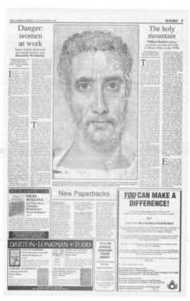Page 6, 19th November 1999
Page 6

Report an error
Noticed an error on this page?If you've noticed an error in this article please click here to report it.
Tags
Share
Related articles
'captivity
Blair Is In Need Of A Touch Of Class
Personal View
Banning Hunting
Learning Charity Towards The Unspeakable Young
Why this self indulgence should not get the Turner prize
Personal view Jill Segger
T0 ESSAY critical comment upon the art of one's contemporaries is to risk giving a hostage to fortune: Ruskin famously accused Whistler of "throwing a pot of paint in the face of the public", whilst Berlioz considered Wagner to be "ripe for the mad-house". It is therefore with some diffidence and with a mind still ajar, that I venture upon the subject of Tracy Emin's bed. For those readers who may have just returned from a prolonged stay in Ulan Bator, I should explain that this Turner Prize entry — currently on display at the Tate Gallery — consists of an unmade bed stained with bodily fluids and surrounded by empty vodka bottles, overflowing ashtrays, dirty underwear and a couple of other objects which are not usually exposed to the gaze of any but one's nearest and dearest. Tracy Emin tells us that this is the bed in which she passed several days "drunk, depressed and miserable". It happens. "Mind has mountains; cliffs of fall... hold them cheap may who ne'er hung there." But what distinguishes the artist from the rest of us must surely be the ability to interpret the experience of those terrible precipices in a manner which transforms the personal and fleeting into that which is universal and enduring. lt is in the gift of the creative artist to sing de profundis in order that meaning may be given to what otherwise might prove to be unbearable.
IN ,1885, an eccentric, lonely, English Jesuit, depressed and isolated in Dublin, underwent what we would now call a nervous breakdown. It is quite probable that during this period of intense misery he took to his bed and lay there in some squalor and disarray. We have no evidence that will prove this hypothesis, but what we do have are six poems which are among the most powerful and moving depictions of the tormented mind that have ever been written in the English language. The Dark Sonnets of Gerard Manley Hopkins are a timeless witness to that grace in the human spirit which enables it to return from the lowest deeps and reach out to others in a manner which could be described, without hyperbole or sacrilege, as salvific. If Fr Hopkins had satisfied himself with a description of the state of his bedroom during this time of anguish, we would be immeasurably the poorer for it and might be forgiven for thinking that the poet had betrayed his vocation.
When the artist reaches beyond his own misery, he transcends his flawed nature and rises above those disfiguring pettinesses which accumulate over a lifetime. Edward Elgar was a touchy and insecure man; his Catholicism, lower middle-class origins and lack of university education all combined to make him feel an outsider. It must in part have been this bitter and prickly sense of disappointed estrangement — concealed beneath the outward semblance of an Edwardian establishment figure — that led him to express his horror at the carnage of the Great War in terms of distress over the death of cavalry horses whilst apparently making light of the sufferings of men. Had the heart-achingly beautiful cello concerto not given a voice to his real grief at the slaughter of a generation on the plains of Flanders and Northern France, such crass remarks would have diminished the memory of a great composer. But the musical response reveals the redeeming truth — a truth which would have been denied us if Elgar had stopped short at a demeaningly self-indulgent and superficial comment upon his inner turmoil.
If Tracy Emin is awarded the Turner Prize at the end if this month, I believe that a disservice will have been done to the artist. By courting controversy Ms Emin has missed an opportunity: she has preferred a short-lived notoriety over the lasting worth of transfigured experience. If she could now use her lost weekend as a catalyst rather than simply showing us its sordid detritus, she might, at some time in the future, fmd a way to communicate the meaning of the experience itself. That could prove to be art truly worthy of a prize.
blog comments powered by Disqus













